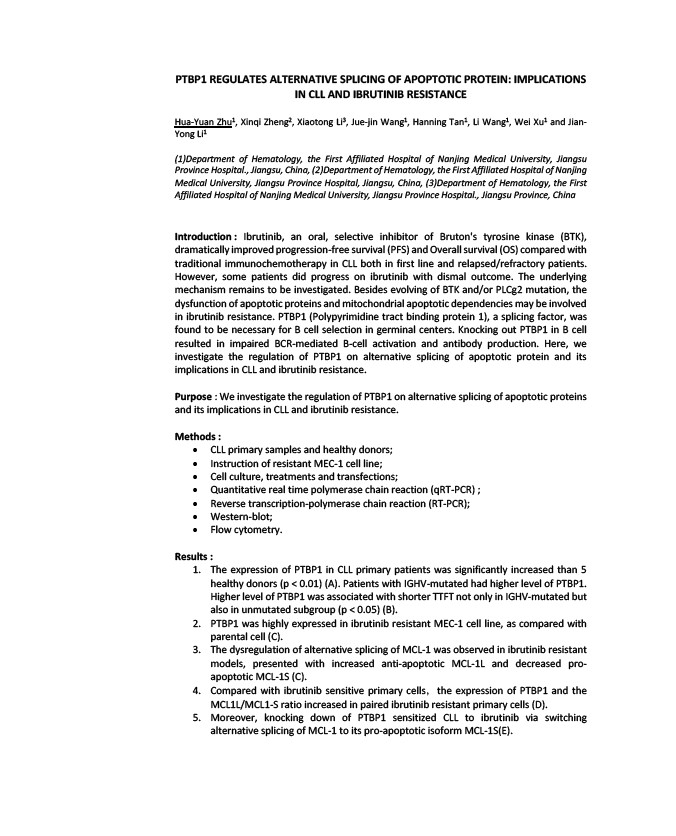
PTBP1 REGULATES ALTERNATIVE SPLICING OF APOPTOTIC PROTEIN: IMPLICATIONS
IN CLL AND IBRUTINIB RESISTANCE
Hua-Yuan Zhu1, Xinqi Zheng2, Xiaotong Li3, Jue-jin Wang1, Hanning Tan1, Li Wang1, Wei Xu1 and Jian-
Yong Li1
(1)Department of Hematology, the First Affiliated Hospital of Nanjing Medical University, Jiangsu
Province Hospital., Jiangsu, China, (2)Department of Hematology, the First Affiliated Hospital of Nanjing
Medical University, Jiangsu Province Hospital, Jiangsu, China, (3)Department of Hematology, the First
Affiliated Hospital of Nanjing Medical University, Jiangsu Province Hospital., Jiangsu Province, China
Introduction : Ibrutinib, an oral, selective inhibitor of Bruton's tyrosine kinase (BTK),
dramatically improved progression-free survival (PFS) and Overall survival (OS) compared with
traditional immunochemotherapy in CLL both in first line and relapsed/refractory patients.
However, some patients did progress on ibrutinib with dismal outcome. The underlying
mechanism remains to be investigated. Besides evolving of BTK and/or PLCg2 mutation, the
dysfunction of apoptotic proteins and mitochondrial apoptotic dependencies may be involved
in ibrutinib resistance. PTBP1 (Polypyrimidine tract binding protein 1), a splicing factor, was
found to be necessary for B cell selection in germinal centers. Knocking out PTBP1 in B cell
resulted in impaired BCR-mediated B-cell activation and antibody production. Here, we
investigate the regulation of PTBP1 on alternative splicing of apoptotic protein and its
implications in CLL and ibrutinib resistance.
Purpose : We investigate the regulation of PTBP1 on alternative splicing of apoptotic proteins
and its implications in CLL and ibrutinib resistance.
Methods :
• CLL primary samples and healthy donors;
• Instruction of resistant MEC-1 cell line;
• Cell culture, treatments and transfections;
• Quantitative real time polymerase chain reaction (qRT-PCR) ;
• Reverse transcription-polymerase chain reaction (RT-PCR);
• Western-blot;
• Flow cytometry.
Results :
1. The expression of PTBP1 in CLL primary patients was significantly increased than 5
healthy donors (p < 0.01) (A). Patients with IGHV-mutated had higher level of PTBP1.
Higher level of PTBP1 was associated with shorter TTFT not only in IGHV-mutated but
also in unmutated subgroup (p < 0.05) (B).
2. PTBP1 was highly expressed in ibrutinib resistant MEC-1 cell line, as compared with
parental cell (C).
3. The dysregulation of alternative splicing of MCL-1 was observed in ibrutinib resistant
models, presented with increased anti-apoptotic MCL-1L and decreased pro-apoptotic
MCL-1S (C).
4. Compared with ibrutinib sensitive primary cells��the expression of PTBP1 and the
MCL1L/MCL1-S ratio increased in paired ibrutinib resistant primary cells (D).
5. Moreover, knocking down of PTBP1 sensitized CLL to ibrutinib via switching
alternative splicing of MCL-1 to its pro-apoptotic isoform MCL-1S(E).